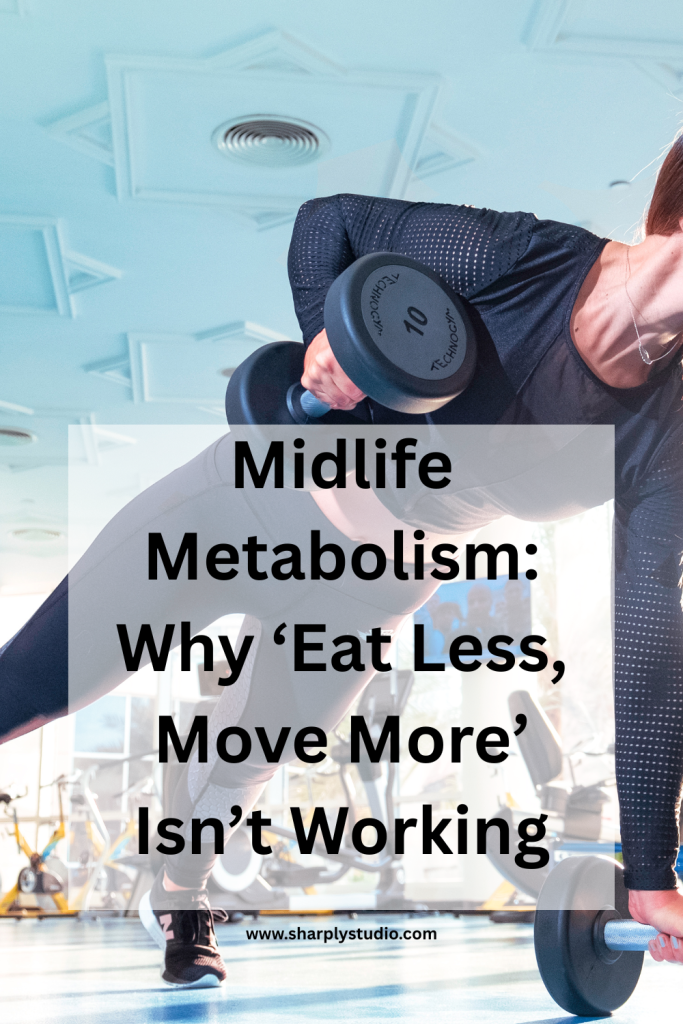If you’re over 40, running a business, and feeling like your metabolism has slammed on the brakes, you’re not alone. One of the most common complaints I hear from women in midlife is:
“I’m eating the same way I always have, but the weight just won’t budge!” It’s frustrating, disheartening, and can make you feel like your body is working against you.
But here’s the thing: a lot of what we think we know about metabolism after 40 just isn’t true. Let’s bust some of the biggest myths together so you can feel confident and empowered in your body again.

Myth #1: Metabolism Crashes Overnight at 40
A common misconception is that the moment you blow out your 40th birthday candles, your metabolism tanks. The truth? Metabolic rate does start to decline with age, but it’s a gradual process not an overnight cliff dive.
Research shows metabolism slows by about 1-2% per decade after age 20. That means by 40, your baseline metabolic rate might only be 2-4% lower than it was in your 20s.
What causes more noticeable weight gain around this time are other factors: hormonal shifts, muscle loss from inactivity, stress, and lifestyle changes not a sudden metabolic collapse.
Your financial clarity doesn’t “crash overnight” either. What causes fog is stress stacking up, ignored routines, or books that haven’t been maintained. Both body and books benefit from steady, consistent upkeep.
Myth #2: There’s Nothing You Can Do About It
Many people believe metabolism is a fixed number we’re stuck with. While genetics play a role, your habits have a huge impact on how efficiently your body burns energy.
Strength training to build muscle, managing stress, getting quality sleep, and eating enough protein can all support a healthier metabolism.
When I started adding more strength-based exercises into my routine, I felt stronger and noticed my energy increase a clear sign my body was working more efficiently.
Myth #3: Eating Less Will Speed Up Weight Loss
When you’re desperate to lose weight, it’s tempting to drastically cut calories. But extreme calorie restriction can actually slow your metabolism further.
Your body interprets severe calorie cuts as a sign of famine and starts conserving energy to survive.
Instead of focusing on eating less, focus on eating enough nutrient-dense foods that fuel your body. Prioritize lean proteins, fiber-rich vegetables, and healthy fats to support both your hormones and metabolism.
Myth #4: Cardio Is the Best Way to Boost Metabolism
Many of us were taught that endless cardio is the key to burning calories. While cardio has benefits, it doesn’t do much for maintaining muscle mass which is crucial for keeping your metabolism strong.
Strength training is your best friend after 40. Muscle tissue burns more calories than fat, even at rest. When you build and maintain muscle, you’re essentially stoking your metabolic fire.
Myth #5: Your Thyroid Is Always to Blame
When metabolism slows, it’s easy to point fingers at your thyroid. While thyroid issues like hypothyroidism do affect metabolism, they’re not the root cause for everyone.
Hormonal shifts during perimenopause and menopause can disrupt insulin sensitivity, cortisol balance, and estrogen levels, all of which affect how your body stores and uses energy.
If you’re concerned about thyroid function, talk with your healthcare provider. But remember: thyroid isn’t the only piece of the puzzle.
Myth #6: Skipping Meals Helps “Reset” Your Metabolism
Some trendy diets encourage skipping meals or fasting for long periods. While intermittent fasting can be helpful for some, skipping meals often backfires for women over 40.
Long stretches without food can increase cortisol (your stress hormone), disrupt blood sugar levels, and leave you feeling more tired and irritable not exactly a recipe for sustainable health.
Instead, aim for regular, balanced meals with protein, healthy fats, and fiber to keep your energy and hormones steady.
And while we’re on the topic of skipping…skipping regular bookkeeping “check-ins” only increases stress. Small, steady reviews keep you grounded.
Myth #7: Supplements Alone Can Fix a Slow Metabolism
I get it: it’s tempting to believe a pill or powder can magically boost metabolism. The truth is no supplement can replace lifestyle habits. Supplements can support your goals if you have deficiencies (like vitamin D or magnesium), but there’s no magic bullet.
Lifestyle strategies like movement, stress management, and sleep are far more powerful than any metabolism-boosting supplement.
In the same vein, fancy tools, random automation, or apps won’t fix messy bookkeeping if the foundational routines aren’t there. Start with a clean business and wellness foundation before adding to it.
Myth #8: It’s All About Calories In, Calories Out
The old “eat less, move more” advice oversimplifies metabolism. After 40, hormonal changes mean your body processes calories differently. Stress hormones like cortisol can cause your body to store fat around the belly. Blood sugar imbalances can lead to cravings.
And poor sleep can disrupt hunger hormones, making you hungrier even if you don’t need extra calories.
That’s why looking at your whole lifestyle, not just calories, is essential.
The Bottom Line: You’re Not Broken
If you’ve been feeling defeated about your changing body, know this: you’re not broken, and you don’t have to settle for feeling stuck.
Small, consistent shifts in how you move, eat, rest, and manage stress can make a big difference in how your metabolism functions.
I always remind myself that my body deserves care, not punishment. When you approach your metabolism with compassion and curiosity, you can work with your body instead of against it.
You deserve to feel good in your skin, no matter your age.
